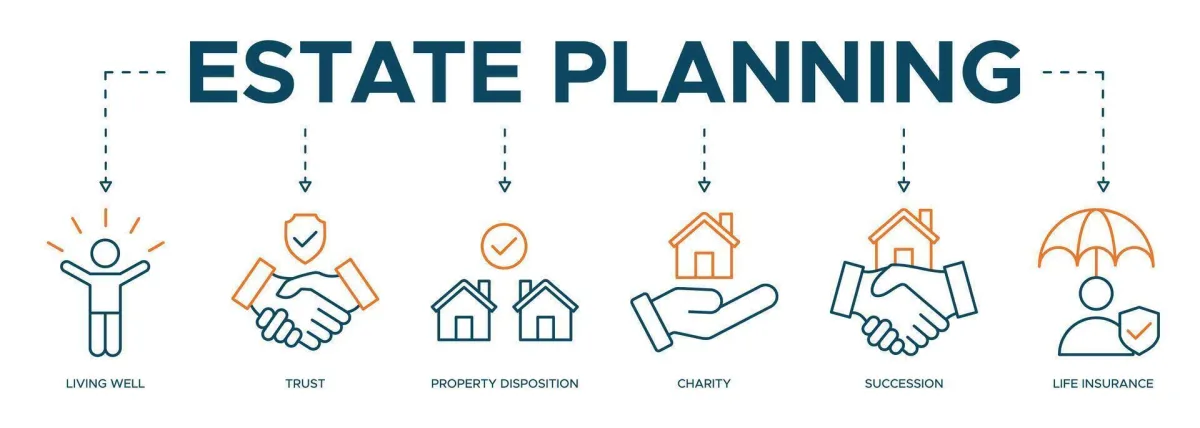
The Estate Planning Process
Estate plans are as much for you as they are for your loved one. By not having a plan in place, your family may be required to make life and death decisions, your assets may go to unintended relatives, and children could be raised by someone appointed by the state.
Fortunately, for most families, estate planning is not complicated. But planning does require making a commitment to completing the necessary paperwork that will be honored in your state. While many documents can be completed on your own, it is wise to have an attorney specializing in estate planning to review them on your behalf.
An Overview of Estate Planning
Estate planning is not just for wealthy individuals who have multiple homes, businesses, and assets. Nor is estate planning something only the elderly should be concerned about. Nearly everyone has an estate and when (not if) something happens to you, having an estate plan will ensure everything you leave behind is taken care of as you wish.
What Does Estate Planning Do?
An estate plan’s purpose is to offer various directives to those caring for you is you become disabled or for those you leave behind. The instructions you provide are included in various legal documents including wills, trusts, beneficiary forms, and the like.
In general, estate plans give medical directives if you become incapacitated in additional and final and financial instructions if you pass away. Estate plans can address almost all concerns your family by determining:
Your end of life services
When life support will cease
Who will take care of your pets
When to move to a nursing home
Who will take care of your children
Who should make medical decisions
Who will inherit your money and assets
The kind of medical care you will receive
How your businesses will continue operations
Proper estate planning makes sure decisions can be made swiftly and as you desire. Failure to create an estate plan will leave important decisions up to the State.
How to Create an Estate Plan
There is never a better time than now to begin creating your estate plan. Begin researching estate planning checklists and start updating important documents. Early steps will include creating a will, updating beneficiaries, and purchasing life insurance.
While there are many steps of estate planning you can do on your own, it is advisable to seek the advice of an estate planning attorney. Every state has different laws that require consideration. Estate plans control your legacy, protect and distribute assets, and can provide for those who you leave behind. If you have any questions about estate planning, please contact my office today to learn more.
Create a will – This is the most basic estate planning tool. A last will and testament will provide instructions as to who will inherit your belongings. Bear in mind, assets will still need to go through the probate process. This means your estate will become public and incur costs to your family.
Create a trust – Generally speaking, a trust separates ownership from use. Trusts allow your property to transfer directly to your beneficiary, without going through probate. Specialty trusts can also be used to maintain eligibility for government programs, special directives for special needs children, or create spendthrift protections.
Establish directives – Directives are useful both medically and financially and are important in the event you become disabled and lose the ability of decision making. Health care directives will keep your family from having to make life-and-death decisions. Powers of attorney can give family members (or other trusted individual) to make financial decisions on your behalf.
Update beneficiaries – Review the beneficiaries named on all retirement accounts and life insurance policies. Make sure you have named the right people. Do not leave beneficiary information blank as the courts will determine who receives the benefits during probate.
Make final arrangements – When a family is grieving, decision making becomes difficult. Make sure you clearly outline your final arrangements so your loved ones can make sure your wishes are met and to avoid conflicts.
Purchase life insurance – Evaluate your family’s life insurance needs and purchase an appropriate amount of coverage. If you are a business owner, life insurance is critical to allow your company to continue operations and maintain preferred ownership positions. Consult with a licensed insurance agent on the best options available to you.
Your estate plan is a living blueprint. Make sure you annually regularly review your plan so it may keep pace with the changes in your life. Also, make sure your documents are stored safely, and in a location known by a trusted individual.
Estate planning will provide the peace of mind knowing of knowing your family will not need to worry about making difficult decisions during the somber time. If you have any questions regarding estate planning or would like assistance starting your estate plan today, please contact my office.

DOWNLOAD OUR:
"UNDERSTANDING ANNUITIES" FREE GUIDE
We’ve created a simple guide to help you understand how annuities work, so you can confidently choose the right option for your retirement future!
Questions? Give Us A Call At:
The Estate Planning Process
Estate plans are as much for you as they are for your loved one. By not having a plan in place, your family may be required to make life and death decisions, your assets may go to unintended relatives, and children could be raised by someone appointed by the state.
Fortunately, for most families, estate planning is not complicated. But planning does require making a commitment to completing the necessary paperwork that will be honored in your state. While many documents can be completed on your own, it is wise to have an attorney specializing in estate planning to review them on your behalf.
An Overview of Estate Planning
Estate planning is not just for wealthy individuals who have multiple homes, businesses, and assets. Nor is estate planning something only the elderly should be concerned about. Nearly everyone has an estate and when (not if) something happens to you, having an estate plan will ensure everything you leave behind is taken care of as you wish.
What Does Estate Planning Do?
An estate plan’s purpose is to offer various directives to those caring for you is you become disabled or for those you leave behind. The instructions you provide are included in various legal documents including wills, trusts, beneficiary forms, and the like.
In general, estate plans give medical directives if you become incapacitated in additional and final and financial instructions if you pass away. Estate plans can address almost all concerns your family by determining:
Your end of life services
When life support will cease
Who will take care of your pets
When to move to a nursing home
Who will take care of your children
Who should make medical decisions
Who will inherit your money and assets
The kind of medical care you will receive
Proper estate planning makes sure decisions can be made swiftly and as you desire. Failure to create an estate plan will leave important decisions up to the State.
How to Create an Estate Plan
There is never a better time than now to begin creating your estate plan. Begin researching estate planning checklists and start updating important documents. Early steps will include creating a will, updating beneficiaries, and purchasing life insurance.
While there are many steps of estate planning you can do on your own, it is advisable to seek the advice of an estate planning attorney. Every state has different laws that require consideration. Estate plans control your legacy, protect and distribute assets, and can provide for those who you leave behind. If you have any questions about estate planning, please contact my office today to learn more.
Create a will – This is the most basic estate planning tool. A last will and testament will provide instructions as to who will inherit your belongings. Bear in mind, assets will still need to go through the probate process. This means your estate will become public and incur costs to your family.
Create a trust – Generally speaking, a trust separates ownership from use. Trusts allow your property to transfer directly to your beneficiary, without going through probate. Specialty trusts can also be used to maintain eligibility for government programs, special directives for special needs children, or create spendthrift protections.
Establish directives – Directives are useful both medically and financially and are important in the event you become disabled and lose the ability of decision making. Health care directives will keep your family from having to make life-and-death decisions. Powers of attorney can give family members (or other trusted individual) to make financial decisions on your behalf.
Update beneficiaries – Review the beneficiaries named on all retirement accounts and life insurance policies. Make sure you have named the right people. Do not leave beneficiary information blank as the courts will determine who receives the benefits during probate.
Make final arrangements – When a family is grieving, decision making becomes difficult. Make sure you clearly outline your final arrangements so your loved ones can make sure your wishes are met and to avoid conflicts.
Purchase life insurance – Evaluate your family’s life insurance needs and purchase an appropriate amount of coverage. If you are a business owner, life insurance is critical to allow your company to continue operations and maintain preferred ownership positions. Consult with a licensed insurance agent on the best options available to you.
Your estate plan is a living blueprint. Make sure you annually regularly review your plan so it may keep pace with the changes in your life. Also, make sure your documents are stored safely, and in a location known by a trusted individual.
Estate planning will provide the peace of mind knowing of knowing your family will not need to worry about making difficult decisions during the somber time. If you have any questions regarding estate planning or would like assistance starting your estate plan today, please contact us.Seniors Mobile Global Contact







